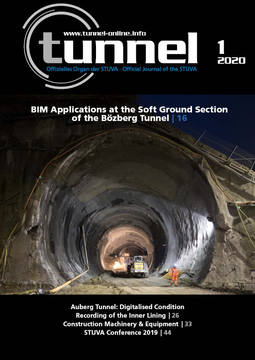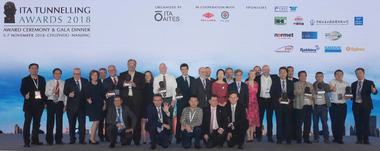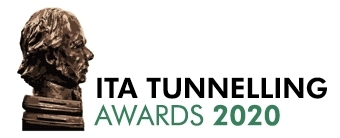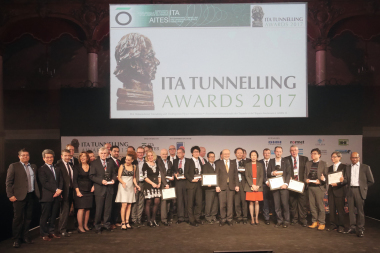5th ITA Tunnelling Awards – The Winners 2019
Since 2015, the international competition “ITA Tunnelling Awards” seeks and rewards groundbreaking innovations and outstanding projects in tunnelling and underground space use. In November 2019 the fifth ITA Tunnelling Awards took place in Miami in conjunction with the 8th Cutting Edge Conference of UCA of SME. President of ITA, Prof. Jinxiu Yan stated: “For this year, we have received 71 entries worldwide and 34 of them are for the three categories yearly tunnelling projects, which means that many outstanding projects have been recently built worldwide.” Winners were awarded in nine categories:
Major Project of the Year (over 500 million euros): Tuen Mun–Chek Lap Kok Link - Northern Connection Subsea Tunnel Section – Hong Kong, China
The Tuen Mun – Chek Lap Kok Link will provide an alternative access route to the Hong Kong International Airport located on Chek Lap Kok Island, which up to now has only been accessible via the Tsing Ma Bridge.
The works comprise a 4.5-km twin-tube sub-sea tunnel with 57 cross passages as well as a 500 m cut and cover section. Construction required two slurry TBMs with an excavation diameter of 14 m. The first 630 m of excavation were operated by the world’s largest TBM with a 17.63m diameter, which was then reconfigured as a 14 m diameter machine. 41 sub-sea cross passages were constructed by mini TBM.
Project of the Year (between 50 million and 500 million euros): Regional Connector Transit Project – Los Angeles, USA
The Regional Connector Transit Project comprises the design-build of a 1.9-mile underground light rail system with three new stations. In order to construct the twin tunnels, a Herrenknecht TBM was rebuilt from Traylor’s University Link Light Rail project in Seattle and modified to navigate the extremely tight radius curves along the alignment.
Major challenges were encountered during the works and consequently, a few innovations were implemented. Unforeseen obstructions during the TBM drive and SEM construction were unique and extremely challenging. Despite this, a one-month delay was turned into a two-month schedule acceleration.
Project of the Year incl. Renovation (up to 50 million euros): Modernization of the Vladivostok tunnel of the Far Eastern Railway, Russia
For the first time in Russia, Mosmetrostroy developed a project and applied the technology of modernization of a railway tunnel, built 82 years ago. The task was successfully implemented with a significant reduction in construction time (by 1.5 years) and the cost of work (2 times) relative to the initial project, according to which it was planned to carry out reconstruction of the tunnel with a complete tunnel closure and the construction of a bypass railway section through the city center.
Technical Project Innovation of the Year: Toulouse Line A Underground Stations Extension, France
The special feature of this project lies in building three underground station extensions, which required the removal of the tunnel lining, while keeping the automatically operating metro running.
A steel rib support lined with steel plates isolated the construction site from the subway in operation and made the construction of the diaphragm walls, the excavation on both sides of the tunnel and cutting of the lining in the extension area possible.
Technical Product/Equipment Innovation of the Year: Autonomous TBM, Malaysia
The aim of this project is the development, testing and deployment of AI algorithms for an autonomous system to operate multimode TBM’s on a tunnelling megaproject. A TBM has over 400 sensors sampling thousands of data points every minute. A computer is highly suited to process these data points and respond instantaneously with appropriate decisions. In contrast, human operators are limited by their ability to only view each data point individually and sequentially, resulting in slower response times.
Innovative Underground Space Concept of the Year: Underground Green Farming, Switzerland
The Swiss Center for Applied Underground Technologies (SCAUT) has developed and commissioned the first “Underground Green Farming” prototype for a sustainable food production by using aquaponics. The system works in a cycle: water from the fish ponds is fed to a hydroponic system and then recirculated back to the aquaculture system. Underground green farming offers the opportunity to produce food locally in urban areas – exactly where the demand is.
Safety Initiative of the Year: Air Quality Working Group An industry-first collaboration on silica dust control, Australia
In Australia, tunnel construction workers have an increased risk of developing occupational disease such as lung cancer and silicosis. Over the period of 12 months, the Australian Tunnelling Society facilitated an Air Quality Working Group (AQWG), which focused on sharing information to address the challenges associated with controlling silica dust.
Young Tunneller of the Year: Amanda Kerr, USA
Lifetime Achievement Award: Dr. Harvey Parker, USA





